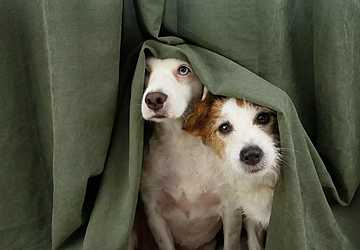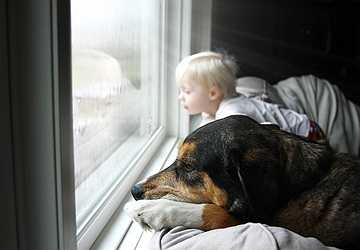Who doesn't love celebrating their good fortune with fireworks? Fireworks are becoming increasingly popular at weddings and other special occasions. However, their loud noise can disturb people resting at home and scare animals.
During a firework display, a cat or dog will run into the house in search of safe shelter. Any loud noises, such as fireworks and thunderstorms, can bother animals as these are unusual events. You can't stop the noise, but you can teach your pet to stay calm in times like these. Read this guide on how to keep your pet calm.

Why are animals afraid of fireworks?
Animals are used to living in quiet places. Exposure to sudden explosions such as thunderstorms and the sound of firecrackers can be stressful for them. However, dogs are more likely to respond aggressively. That's why fireworks and thunderstorms can bother pets.
Loud noise
Animals have a sensitive and acute sense of hearing compared to humans. Thunderstorms and fireworks can make loud and unpredictable noises that can be distressing. Sudden sharp and loud explosions, noises, and reverberations can startle and overwhelm a dog.
Unfamiliar
Fireworks are not part of a dog's natural environment, and he may not understand the source or reason of loud noises and bright lights. This strangeness can lead to fear and anxiety.
Sensory overload
Fireworks not only make a loud sound, they also produce bright flashes and sometimes a strong smell. This combination of sensory stimuli can be overwhelming for dogs and increase their fear response.
Lack of control
Dogs are law-abiding, controlling animals. Fireworks are beyond their control, and the unpredictability of sounds and lights can leave them feeling intimidated and uncertain.
Previous negative experience
Based on past experience, dogs may be afraid of fireworks. When dogs associate loud noises with fear-inducing situations, such as being alone or experiencing trauma during a fireworks show, this can cause them to feel anxious and fearful in later situations.
Symptoms Dogs Are Afraid of Fireworks
A pet's fear of fireworks can manifest in a number of ways. Also, the severity of symptoms varies from dog to dog. Some of the most common symptoms of a dog startled by fireworks include:
Shivering and trembling: Dogs may visibly tremble or tremble due to the stress and anxiety caused by fireworks.
Excessive panting and drooling: Anxiety can cause dogs to pant and drool excessively.
Pace and restlessness: The dog may exhibit restless behavior, constantly walking around the house, or being unable to settle down in one place.
Hiding or Refuge: A dog may try to find a safe hiding place to escape a perceived threat. It can be under furniture, in a closet or behind a curtain.
Vocalization: Dogs may bark, whine, or howl excessively due to the loud sound of fireworks.
Destructive Behavior: Anxiety can lead to destructive behavior when the dog tries to escape or seek relief. They will chew on furniture, scratch doors or dig up carpet.
How to Protect Your Pets from Firework Hazards
The bright lights and loud noises of fireworks and thunder can cause fear in dogs and other pets. Follow these simple tips to protect your pet from fireworks fear and stress.
Build a safe space
Provide pets with a safe place to play during thunderstorms and fireworks. This could be a bedroom or anywhere else in the house. However, make sure the space is comfortable and away from doors and windows.
Keep them indoors
Do not take pets out to play during thunderstorms and fireworks. Even if your pet likes to play outside, the loud noise of fireworks or thunderstorms in this situation can startle them and cause them to become anxious. Make sure all doors and windows are locked to prevent escape.
Allow interference
Create a calm and soothing environment for your pet through distraction. You can play soft, soothing music in the house to minimize the noise of fireworks in the room. Provide them with their favorite toy or puzzle to engage in something productive and positive.
Use calming techniques
Use calming techniques to help your pet relax. Consider products that release synthetic pheromones, such as calming pheromone sprays or diffusers, to help reduce your pet's anxiety. You can also try natural sedatives or consult your veterinarian about suitable options.

Stay with your pet
Stay as close to your pets as possible during fireworks displays. Their presence can bring them comfort and a sense of security. Talk to them in a calm tone and avoid reacting to the fireworks yourself, as your pet can sense your feelings.
Microchips and ID tags
Make sure your pet is properly identified via a microchip and is wearing a security collar with an updated ID tag. If your pet runs away or gets lost during a fireworks display, it increases the chances of returning safely.
Consult your veterinarian
If you know your pet has an intense fear or anxiety about fireworks, consult your veterinarian. They may offer additional strategies or recommend appropriate anti-anxiety medication or therapy to help your pet cope with fireworks.
Desensitization training
You can also get your pet used to sudden and loud noises. Gradually expose them to low-volume sounds and associate them with positive experiences or rewards. This training can help them become more accustomed to the noise and potentially reduce their anxiety.
Final verdict
Fireworks have ingredients that are common in life. Instead of thinking about rejecting it, help your dog live with it. You can distract them with toys. Let your dog play with it and run around. You might miss firecrackers and thunderstorms.
